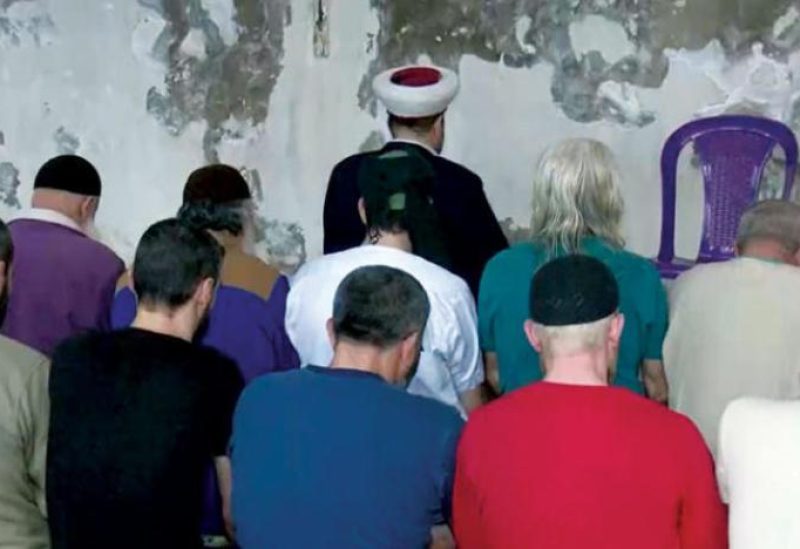
A photo released by the Lebanese Internal Security Forces shows prisoners performing Eid al-Fitr prayers in Roumieh jail. (ISF on Twitter)
The Lebanese caretaker government of Prime Minister Najib Mikati has developed a plan to deport Syrian prisoners, despite faltering in developing political and legal mechanisms to return the displaced back to their home country.
The ministerial committee tasked with following up on the return of the displaced tasked Justice Minister Henry al-Khoury with discussing the possibility of turning over Syrian detainees to their country immediately, according to relevant laws and agreements.
Khoury told Asharq Al-Awsat that the return of Syrian prisoners in Lebanon to their country is a “sensitive issue and should not be dealt with hastily.”
There are 1,800 Syrians, who have committed criminal offenses, in Lebanese prisons, 82 percent of whom have not completed their trials.
The Minister explained that the issue of Syrian prisoners requires careful legal consideration, and if the prisoner also has a pending judicial case in Syria, the procedures may be easier to transfer them and complete their trial in their country.
However, if the detainee does not have a case in Syria, once released, they might return to Lebanon illegally, warned Khoury.
He said a ministerial and technical delegation will visit Syria to discuss the return of the displaced, but the detainees and convicts’ issue is still under consideration.
A source familiar with the prison issue told Asharq Al-Awsat that dozens of pre-trial detainees are awaiting judicial verdicts, including 143 Syrian minors, in Lebanese jails.
A security source concerned with the prison file admitted that thousands of Syrians in Lebanese prisons are deepening the prison crisis and are a burden on state resources.
Speaking to Asharq Al-Awsat, the source, who declined to be named, believed that the deportation of prisoners is usually linked to agreements signed between two countries.
He noted that it was a complex issue and difficult to resolve, questioning the process of returning convicts and detainees while the state has yet to come up with a mechanism to return the displaced.
Lawyer and human rights activist Diyala Shehadeh stressed that Lebanon is committed to the Universal Declaration of Human Rights and the International Convention for the Protection of All Persons from Enforced Disappearance.
In an interview with Asharq Al-Awsat, she warned against violating the laws that must be followed in repatriating detainees, as it requires the concerned country to submit an extradition request.
Shehadeh cautioned that handing over these prisoners may expose them to persecution and physical and economic harm and the possibility of their involvement in the armed conflict, whether through forced conscription or by joining armed factions.